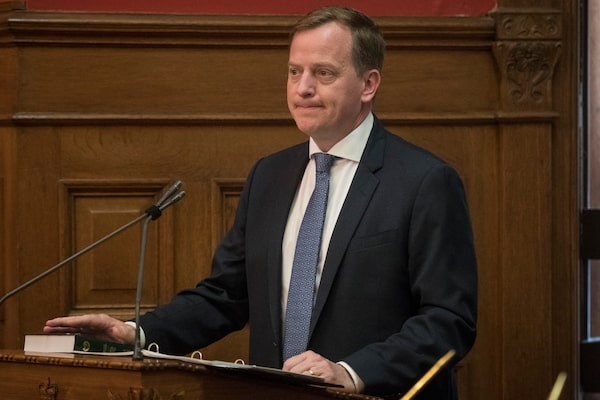
Ontario's Minister of Environment, Conservation and Parks Jeff Yurek, seen here, says the the province remains 'committed' to fighting 'the job-killing carbon tax.'Tijana Martin/The Canadian Press
Ontario filed an appeal Wednesday with the Supreme Court of Canada in its challenge of the federal carbon tax, as several provinces prepare to ask the high court to conclude that the Trudeau government’s signature climate change policy is unconstitutional.
The Ontario case, which saw the province’s Appeal Court uphold the federal carbon pricing scheme in June, is one of several legal challenges from conservative provinces. Ontario’s appeal is widely expected to be combined with a similar case out of Saskatchewan, which has a hearing set for Jan. 14, and Alberta has also launched its own case, although it appears increasingly unlikely that will make it before the Supreme Court by the new year.
The carbon tax is also expected to be a significant issue in the fall federal election, as Conservative Leader Andrew Scheer has pledged to scrap the policy. A Conservative win could render the legal cases moot.
“We remain committed to using every tool at our disposal to fight against the job-killing carbon tax, which is making life more expensive for Ontario’s hard-working individuals, families and businesses,” said a statement issued by Ontario Environment Minister Jeff Yurek.
The province’s notice to the Supreme Court does not spell out its legal arguments.
In 2018, the federal government announced that all provinces would need to implement a carbon-pricing system by April 1, 2019 and those that didn't would fall under a federal carbon tax. But what is carbon pricing anyway?
The Ontario Court of Appeal issued a 4-1 ruling in late June that concluded the federal law, which imposes a carbon tax on provinces that don’t implement their own price on carbon, is constitutional.
In Saskatchewan, that province’s Appeal Court reached a similar conclusion in May with a 3-2 ruling endorsing the federal tax.
Alberta, whose United Conservative government won the April election with a promise to launch its own challenge, filed legal arguments earlier this month. No date has been set to hear the case, although it’s not expected until at least November.
Amir Attaran, a law professor at the University of Ottawa who is representing the Athabasca Chipewyan First Nation in the carbon tax cases, said that does not give the Alberta government enough time to have its case heard, decided and then added to the Supreme Court hearing by January.
He noted that just last week, the Supreme Court rejected an attempt to delay the Saskatchewan hearing by several months in order to accommodate an appeal from Alberta.
“That doesn’t give Alberta sufficient runway to conduct a case,” he said in an interview. “They’re out of runway, and their refusal to accept reality is, I think, purely for political purposes."
Eric Adams, who teaches constitutional law at the University of Alberta, said it seems extremely unlikely that the Alberta Court of Appeal will move fast enough to issue a ruling before the Supreme Court of Canada hearing.
If not, he said Alberta’s Appeal Court could very well decide it’s inappropriate to continue the case at all.
“No court of appeal is interested in putting its oar into a matter that has already been recently decided by the Supreme Court or is pending at the Supreme Court,” he said.
“I think a court is far more inclined to say that these issues will be in front of the Supreme of Canada and will be addressed accordingly."
Alberta expects its legal challenge to cost $300,000. A spokesman for Premier Jason Kenney said the province plans to press ahead with its legal challenge regardless of what happens with the Saskatchewan case.
Saskatchewan’s Justice Ministry issued a statement that said the January hearing is “tentative” and could still be delayed.
“Saskatchewan believes that it makes sense for the Supreme Court to allow an extension to hear our challenge so that, as a country, we can deal with this issue in the most efficient way possible,“ the statement said.
Manitoba also has a case before the Federal Court.
Federal Finance Minister Bill Morneau criticized Ontario for its appeal and said the province has no plan for the environment “beyond stickers on gas pumps and now a costly and unnecessary Supreme Court challenge.”
“This is not the course Ontarians want their government to take but we will defend our plan because it is the right thing to do now and for our future,” he said in a statement.
With a report from Jeff Gray in Toronto